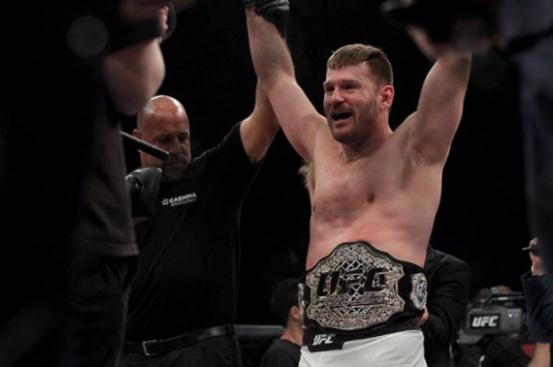- Commissioner’s statement on Ventura, Marte
- Ronnie O’Sullivan: Masters champion ‘felt so vulnerable’ in final
- Arron Fletcher Wins 2017 WSOP International Circuit Marrakech Main Event ($140,224)
- Smith challenges Warner to go big in India
- Moncada No. 1 on MLB Pipeline’s Top 10 2B Prospects list
- Braves land 2 on MLB Pipeline’s Top 10 2B Prospects list
- Kingery makes MLB Pipeline’s Top 10 2B Prospects list
- New Zealand wrap up 2-0 after Bangladesh implosion
- Mathews, Pradeep, Gunathilaka to return to Sri Lanka
- Elliott hopes for rain for Poli
Opinion: Heavyweight Gold and Short-Term Memory
- Updated: May 20, 2016

Stipe Miocic is the man of the hour. The 33-year-old returned home to Cleveland, Ohio, with the Ultimate Fighting Championship heavyweight title in hand after knocking out Fabricio Werdum in the UFC 198 main event on May 14. Miocic now resumes his double life, with a twist. Instead of being a firefighter and aspiring UFC contender, he is a firefighter and the “Baddest Man on the Planet,” courtesy of his newly seized heavyweight crown. While Miocic’s blue-collar story should endear him to domestic audiences and beyond, it should not put new paint on the fact that high-level mixed martial artists, including those in the UFC, still hold day jobs and must rely on alternate incomes. It’s a reality the UFC omits whenever possible. Knowing the guy in the main event also works door security at a bar isn’t a hot selling point. Miocic is the exception, with his noble firefighting pursuits. Look at the UFC’s top stars: Conor McGregor and Ronda Rousey. McGregor’s popularity comes from his lavish life as champion and persona as a cutthroat businessman. Rousey overcame a childhood tragedy and self-esteem issues to become and Olympic bronze medalist, UFC champion and confident cover model. The common viewer cannot imagine the life they lead, and that’s part of their appeal. The idea of working two jobs for less recognition and unseen consequences resonates but not in a positive fashion. Fighting is seen as an opportunity, not a career path. The lottery factor in such sentiment muddies the massive resistance to opportunity in the field: financial obstacles, entertainment politics and consequential physical deterioration. How can a title challenger like Chris Cariaso be expected to beat one of the world’s best in Demetrious Johnson for a disclosed payday of $24,000? How about the $55,000 Ovince St. Preux was paid to face pound-for-pound king Jon Jones on short notice at UFC 197? Was the damage Rory MacDonald suffered at the hands of welterweight champion Robbie Lawler worth $59,000, before expenses and taxes? Preparing for a 25-minute (or less) fight is a full-time job, and divided attention — when one considers the media obligations someone like McGregor has to live up to — can translate to a beating. That’s the crux of McGregor’s current squabble with the UFC. The featherweight …
continue reading in source www.sherdog.com
